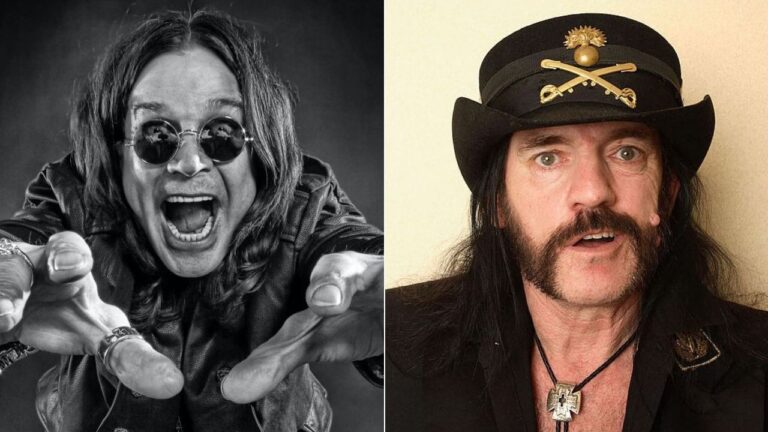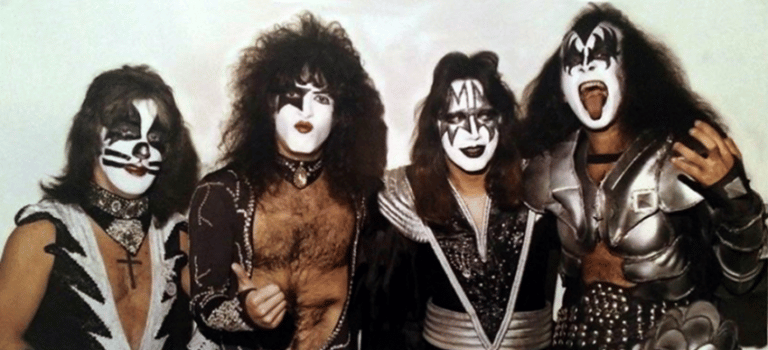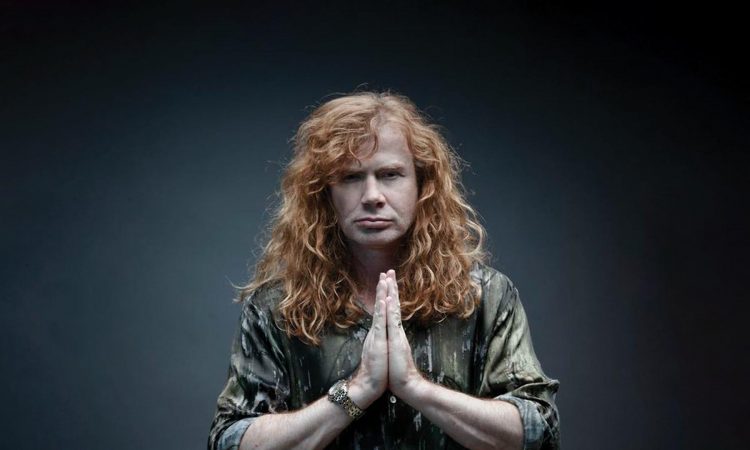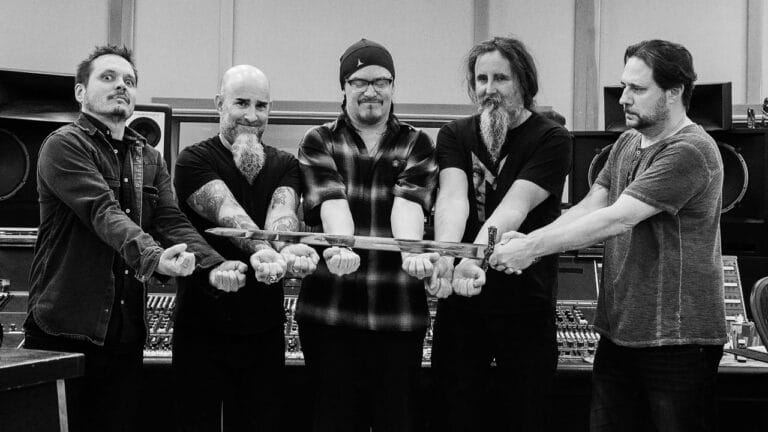Michael Sweet on Stryper’s The Final Battle, Working with George Lynch, Overcoming Health Scares, and More

All images courtesy of Freeman Promotions
After speaking with Stryper’s founder, frontman, and mouthpiece for 30 minutes, one thing was certain: his passion for music is undying, as evident by his closing words, “When I have a guitar in my hands, that’s home to me.”
If we dial back to 1984, we’d find a 21-year-old Sweet doing as he does now, fronting an upstart Stryper. As champions of so-called “white metal,” Stryper took an alternative path from its peers. Choosing to write about positivity, faith, and all things altruistic, Stryper eschewed the par-for-the-course “sex, drugs, and roll ‘n’ roll” template, which found many of the band’s scene mates feeling the wrath of Tipper Gore and company’s “Satanic Panic.”
“It was a weird position for us to be in,” recalls Sweet. “We were on the other side of it, and we were mostly unbothered by what was happening. I could see both sides of it, but luckily, we were unaffected by it. We didn’t sing about those things, so there was no reason for us to be bothered by it. Regardless of what was happening, Stryper always kept its head down and did things the way we felt made sense and what was right for us. It worked for us then, and it’s what has kept us working now.”
At 59 years of age, Sweet is now recovering from multiple surgeries, which nearly resulted in the loss of his sight. Despite the naysayers and detractors, Stryper has rocked some of the world’s biggest and grandest stages, soaring up the charts on the backside of multi-platinum albums. Stryper’s story is one of perseverance, individualism, and success via an unflinching vision. While many things have changed for Stryper, the one constant has been Sweet’s presence. And after nearly 40 years in the game and having experienced the type of success that some would sell their soul for, Sweet’s intent is as resolute as it was back in 1984.
“Man, I don’t take a second of this for granted,” quips Sweet. “I’ve always been thankful, but things come into greater focus when you go through what I have recently. I live for playing music, and a huge part of that comes from my ability to play guitar and sing. When you’ve been doing something one way for your whole life, like playing guitar, and you suddenly have to do so in the dark to prepare for the word, for lack of a better word, that’s eye-opening.”
In the wake of yet another victory snatched from the jaws of defeat, Michael Sweet dialed in with Metal Castle in running through the origins of The Final Battle, nearly losing his sight, his unique working relationship with George Lynch, and how Stryper’s faith intertwines with its music.
How did the health scares you’ve been through affect the outcome of The Final Battle?
Initially, I thought it would affect it negatively to the point where we’d have to reschedule, postpone, or maybe even cancel. And because of our schedule, our calendar is so full for the next few years, so it’s hard to fit new things in. I was nervous about that and apprehensive, but thank God; we were able to move forward. I started wearing an eyepatch while I played, which was weird. I started doing that right at the tail end of the surgery. I wasn’t used to playing without my right eye, so that was a challenge that shaped this record, without a doubt.
After my first surgery, I was laid up for about two weeks, and then I was able to write the album. And then I had my I had a second surgery on the eye, and then I was able to go in and start recording. So, the timing of those surgeries really worked to my benefit, even though I didn’t think they would. I am thankful that everything worked out, and I think because of the handicaps, obstacles, and issues, I think it drove us to work harder, try harder, and achieve more.
Did the underlying fear of losing your sight alter your lyrical approach?
I was going through a lot mentally and at times, and I was certainly thinking the worst. If I’m being honest, I still do occasionally because my vision is badly altered in that eye. I can see out of that eye, but everything’s blurry. So, it’s pretty much useless, and it will probably stay that way indefinitely. And then my other eye has two tears in it, so I’m also susceptible to detachment with that eye, too. So, I’ve got all these thoughts going through my head, but then I remind myself that we all have our issues that we have to face and deal with. And comparatively, if that’s what my issues are, it’s not so bad.
So, I’ve been practicing and playing in the dark and trying to get used to playing without looking at my guitar neck. It’s been an adjustment, but playing in the dark has helped me cope and learn how to re-approach the guitar. So, with the writing, I went into it trying to keep a good attitude and not letting anything bring me down. I had to keep telling myself, “I’m gonna overcome this,” and I did. That thinking got me to a place where even though it was difficult, I was able to get through it.
 All images courtesy of Freeman Promotions
All images courtesy of Freeman Promotions
Stryper has never been shy about injecting its collective faith into its music. How important has that faith been in guiding you through your recent struggles?
Well, as everybody knows, or at least I hope everyone knows, we are a band of deep faith and rely on that. We believe in God, that God put us together, and that God will get us through tough times in whatever storm comes our way. That’s who we are, how we are, and what we believe. We always pray before everything we do, whether it’s a live show, an album, a tour, or whatever it may be. We’re always praying and asking God to help guide us through it, get us through it, and give us the strength to manage it. And that’s an integral part of who we are and what we do.
If we didn’t do that, I believe Stryper wouldn’t be the band that it is today. To be honest, we probably wouldn’t even be a band. I think that’s helped us through tough times and various personality differences because we’re like any other band; we don’t get along at times. When you’ve got four strong personalities, sometimes they clash, and if we were a typical band that didn’t have faith, we’d probably break up over it as other bands do. So, I think God helps get us through those tough times, personality issues, and my health scares, too.
“Transgressor” features one of your strongest vocal performances in years. What was your approach?
With that song, in particular, I wanted to draw from my deepest and dearest Judas Priest influences and then draw those elements from within me and inject them into the song. I’m a big Priest fan, I think they’re the greatest metal band of all time, and it’s no secret that Rob Halford has deeply inspired me as a vocalist. So, I wanted to draw from that and do something that was exciting and inspiring. I hope that when people finally hear “Transgressor,” they feel inspired to the point that they say, “Wow. That’s incredible.” My basic goal was to do something cool with the vocals but, musically speaking, do something heavy that takes the listener on a ride. So, I did that by hitting 100 miles an hour right out of the gate and didn’t stop until I felt like my voice was gonna give out. It’s 100 miles an hour, like a roller coaster. I am proud of that track because it challenges you to the point where you can’t catch your breath.
I feel that “Same Old Story” does a great job of illustrating your fearlessness as a lyricist.
That’s a good point because that track, lyrically, is talking about how it’s “the same old story,” meaning we talk a lot but don’t do a lot. Everybody talks the talk, but they don’t walk the walk, meaning they don’t typically back it up. Some people do, but most people don’t. And because of that, most things never change or evolve. For example, in our voting and political system, we just witnessed a disaster with the blue and red sides, and it’s the same bullshit repeatedly. And it’s like, will it ever change? Man, I hope so. But the only way it can change is if somebody can change people and make them put their actions behind their words.
 All images courtesy of Freeman Promotions
All images courtesy of Freeman Promotions
Would you say that most bands from your era are afraid to tackle some of the topics that Stryper does?
I think most bands avoid some of these topics. Not all, but most. And there are some legitimate bands out there that when they sing about the devil, they mean it. These bands are true Satanists or atheists. They’re genuinely standing behind what they’re singing about, and they mean it. But I think, for the most part, most bands follow the leader. And that results in the usual metal themes about evil, pentagrams, and the devil, which are such stupid, and silly cliches. When you stop and think about it for a minute, metal is about rebellion, and the ultimate rebel was Christ. I don’t know of a bigger rebel than Christ compared to anybody who has walked the face of the Earth. He rebelled against the system and how everyone did things and was crucified for it.
So, that’s about as rebellious as it gets, and that’s what we sing about. And we’re 100% metal and easily as metal as any other band out there that sings about the devil. We wanted to break the mold because we’ve always been tired, exhausted, and bored with everyone following each other and doing the same crap. Whether it’s lyrically or musically, I think it’s essential to start your own trend, be your own band, and have your own original sound, look, and vibe. It doesn’t matter if people love or hate it, do something different, go against the grain, and be a leader, not a follower. Stryper has always tried to do that; whether we’ve accomplished that or not, we’ve always tried to be leaders and not followers.
What difficulties has Stryper endured in eschewing typical rock and metal tropes?
We’ve taken a lot of heat, and we still do. What can I say? People judge the book by its cover with Stryper. They know that we sing about God, so they close the door on us and say, “I don’t want to hear about God. I’m not willing to listen to their music.” So many people completely ignore us and won’t take the time to see if we are even somewhat decent. So, they ignore us and write us off, all because we’re singing about God. You can’t imagine how often I’ve heard “you suck” because we sing about God. So, getting doors slammed in our faces by a lot of people has been the life story of Stryper.
Having said that, we’ve got a lot of fans out there who have helped us sell multi-platinum albums and sell out venues worldwide. So, even though we’ve gone against the grain and done something different, unique, and unfavorable, we’re still accepted by the masses. And there are a lot of people out there who believe what we believe and agree with what we do and how we do it. So, it’s cool that we’ve got such a strong fan base; to us, it’s meaningful. And I think that makes all the naysayers and the haters scratch their heads to where they say, “How the hell is this possible?” Well, it is possible because we’re not all the same. We live in a free country and, most importantly, a free world.
Would you say people need to share a similar mindset to listen to Stryper? Or is the appeal universal?
Stryper has taken its message out to the masses, and I think it’s a breath of fresh air. I think a lot of people have burned out on the same old stuff, you know? It’s like, how many times can you sing about devils and demons? Doesn’t singing about sex and booze get old? Isn’t that rather boring for you at some point? I think so. When I was a kid growing up, before I committed my life to God, I used to listen to some of the lyrics and laugh. You might not believe that, but it’s true. I used to think, “Oh, my gosh, you’re kidding me. This is so cheesy.” And that’s precisely the reason why Stryper chose to do something different.
The funny thing is that it goes both ways; some people think our lyrics are cheesy, and that’s fine. I totally get it. But it’s usually most of the time because they don’t believe in God, and they don’t share our beliefs. But oddly enough, we have a lot of atheist fans. And when I say a lot, I really do mean a lot. I see it every day on my Facebook page; they’re there commenting and letting people know their side of it. And what’s even more interesting is Stryper even has Satanic fans. These are members of the Satanic church, yet they’re big fans of Stryper. They disagree with the lyrics but love the music and sound.
How has Stryper evolved since The Yellow and Black Attack?
Oh, man, well, I think the youthful energy is the thing about The Yellow and Black Attack that attracted people and still does. It was not polished, but that didn’t seem to matter. We were just four kids trying to do our best, and the album has a true rawness to it that can’t be duplicated. But the imperfections make the whole thing work, and they keep people returning to it even today. And if you fast-forward to today, we’ve been able to gain some things, but we’ve lost some things. We’re closer to perfect now because we’re more experienced, but with that, you lose some of that sense of wonder you carry with you when you’re a kid.
But when I say “perfect,” I don’t know if that’s even the right word because there is no “perfect.” We’ve been able to hone in on our craft and get better at how we do things, which is translated into how we sound. And I think you can hear the maturity in the band through the music on The Final Battle. But at the same time, we’ve worked to keep that rawness and that energy, and I think this album, maybe more than any of our other records, found the perfect balance between the youthful, raw power we had and the newfound, mature, and polished band that Stryper has become.
Did Stryper feel comfortable amongst the debauched ’80s Sunset Strip scene?
We just did what we did and tried not to worry about the noise around us. The way I recall it is that we tried not to think too much about it. We knew we were different and had a target on our backs because of it. It would have been easy for us to be like, “Should we do this? No, we can’t. This isn’t working. Let’s try that.” Because that type of second-guessing, or lack of comfort, could easily have halted what we were trying to do. So, we just did what came from the heart and applied that to our lyrics, music, and look.
I remember that people call us the “bumblebees of metal” because of the yellow and black, and it’s like, “Whatever. That’s our thing. We don’t care what you think.” And what those people didn’t realize was that our yellow and black colors signified something and that the stripes meant something. It was beyond them to see that there was a point to it and that it all meant something to us. We’re proud of that and have zero regrets about how we handled it. I think it’s important to follow your heart if you’re in a band. You have to follow your convictions, be a leader, and be true to who you are. If you do that, you’ll always be comfortable because you’re walking your path, not someone else’s.
 All images courtesy of Freeman Promotions
All images courtesy of Freeman Promotions
What did you take away from your time in Boston that still influences you, if anything?
Well, I grew up with Boston, and Brad [Delp] greatly influenced me. I remember hearing the first Boston album when I was 13, and it blew my mind. It affected me as a young musician and taught me to strive to be a better writer, producer, guitar player, and singer. Boston is undoubtedly part of the musical puzzle that helped shape me into who I am today. So, fast forward to 2008, and I’m a member of Boston and touring with them, and it was a pinch-me moment. It was hard to believe then, but God brought Tom [Scholz] and me together; I really believe that. Because Tom was reeling due to Brad Delp committing suicide, and I was going through a situation with my wife, who was dying of cancer. So, when I look back on that time, I’m sure God brought Tom and me together to help each other through those tough times. That’s my takeaway from my time with Boston.
Of the many guitarists you’ve paired with, who has been your favorite to work with, and why?
It’s funny you ask because I was thinking about this earlier this morning. If I had to pick three guys who emerged in the ’80s that inspired, motivated, and made me smile, I would have to start with Randy Rhoads. After that, believe it or not, I would say Vito Bratta, whom I’ve never worked with but did tour with. I think he’s one of the most underrated and amazing guitar players ever because he was so melodic, and his solos were just so beautifully written and masterfully crafted. And after that, I would say, George Lynch, who I have worked with, and still do work with.
If we’re talking strictly about the guys I’ve worked with, I think Tom Scholz is a great guitar player. But we have to remember that he’s so much more than just a guitar player, right? Tom has a great musical mind and is a great producer and navigator. And then, we can’t forget the great Tracii Guns, a great guitar player. Tracii has this incredible blues-rock vibe, and he can play anything you ask him to, which is rare. But again, if I had to pick one guy, I would pick George Lynch. Not only is he in my top three from the ’80s, but he’s the guy I’ve worked with that is simply on another level.
I’m wrapping up the third Sweet & Lynch album with George right now, and I love George’s fire. But as everyone knows, I think he’s an atheist, and I’m a Christian, so you might think, “How can that work?” We just put everything aside and go into it thinking about the music. We put the music first instead of our spiritual and religious differences, and it works wonderfully. And I love George; he’s such a great guitar player, man, one of my all-time favorites. It’s an honor to be able to work with him.
After all that you’ve been through recently, do you feel Stryper has a new lease on life?
Oh, gosh, good question. I don’t know if I’d describe it as a new lease on life, but we still have life left in us. And that life is manifesting as some incredible music, and I’m excited about that. I still love what I do. I still love making, writing, producing, and playing music. It still puts a smile on my face, and I still get a certain energy from it. I feel at home when I’m making music.
So, as long as that feeling is there, then that lease you talked about will be extended. And as long as that’s extended, I’ll continue moving forward, taking every opportunity I feel comfortable taking. There are things I’ve passed on over the years that people have asked me to do simply because I wasn’t comfortable doing them. So, that’s a big part of it; I’ve got to feel good about it. And that’s exactly why everything I’ve done so far, I’ve done so with a smile and a genuine level of excitement.
 All images courtesy of Freeman Promotions
All images courtesy of Freeman Promotions
– Andrew Daly (@AJDWriter88) is a contributing writer for Metal Castle and may be reached at andrew@vinylwriter.com






